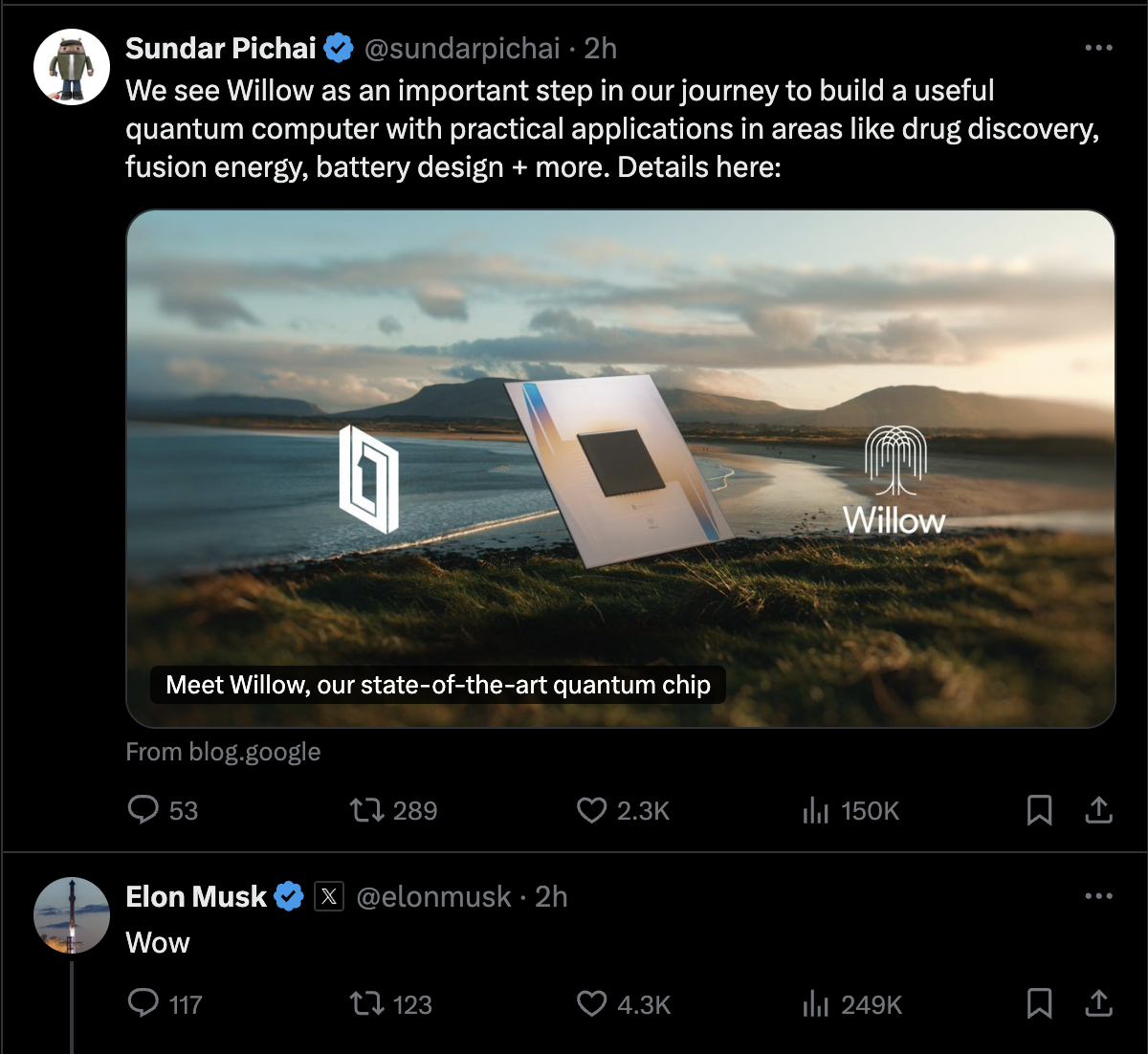Willow Wows Elon Musk in X Exchange With Sundar Pichai

Insider Brief
- After remaining largely silent on quantum computing, Elon Musk signaled newfound interest when responding “Wow” on X (formerly Twitter) to Alphabet and Google CEO Sundar Pichai’s unveiling of Google Quantum AI’s new “Willow” chip.
- Willow achieves both exponential error reduction and unprecedented computational speed, enabling it to solve problems in minutes that would take the world’s fastest supercomputers 10 septillion years.I
- In their exchange, Musk and Pichai explored not only quantum’s transformative potential but also broader visions of civilization’s future energy use, hinting at a shared ambition to harness advanced technologies for planetary-scale progress.
Elon Musk, who hasn’t been vocal on his support for quantum, suddenly seems more interested, based on a recent social media exchange on X (formerly Twitter).
When Alphabet and Google CEO Sundar Pichai introduced the company’s advance in quantum computing technology and found himself in a moment of alignment with billionaire entrepreneur Elon Musk.
Pichai posted about the 105-qubit Willow, Google Quantum AI’s latest quantum chip, which he described as achieving two major feats that could dramatically accelerate the path toward commercially relevant quantum applications.
Pichai, who took over as CEO of Google in 2015, has guided the company into emerging fields of artificial intelligence and now quantum computing, also outlined the chip’s capabilities. First, Willow pushes quantum error correction forward, demonstrating an “exponential reduction of errors” as more qubits are added. This milestone addresses a decades-old challenge in the quantum community, potentially paving the way for larger, more reliable quantum processors. Second, Willow’s performance in a standard benchmark test left traditional computing power in the dust. The chip solved a problem in about five minutes that would occupy one of the world’s fastest supercomputers for a staggering 10 septillion years—an eon so vast it overshadows the age of the universe.
Elon Musk, who has built his reputation on ambitious projects spanning electric cars, rockets, brain-machine interfaces, and more, rarely weighs in on quantum computing — an area as complex and specialized as any frontier he’s embraced so far.
Thw revelations about Willow, howeverm seemed to pique his interest. In a single-word response to the news, Musk wrote simply, “Wow,” — and Pichai upped the ante. The Google chief suggested that maybe one day they could place a “quantum cluster in space with Starship,” referencing SpaceX’s planned spacecraft designed to ferry humans and cargo to the Moon, Mars, and beyond.
Musk’s reply? “That will probably happen.”
He then discussed a cosmic philosophy, referencing the Kardashev scale, which classifies civilizations by their energy usage and technological prowess. Musk believes humanity is less than 5% of the way to a Type I civilization — one that fully harnesses the energy resources of its home planet. To reach about 30%, he suggested installing solar panels across all desert or highly arid regions.
Pichai agreed, noting that solar energy remains underutilized despite its abundance. The two executives may have stumbled onto a shared vision of leveraging advanced technology — quantum computing in Google’s case and spacefaring capabilities in Musk’s — towards grand-scale solutions for human progress and sustainability.
